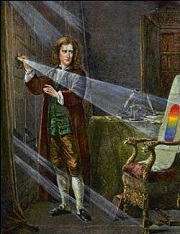Ramblings - First published February 2021

 Ramblings from David
Ramblings from David

Spectrum
Spring is still some time away but the local woods have already started to increase with the sound of birds – like early risers in anticipation of the approaching change. Making the time to see the changing patterns in the world, being part of the life that we are all privileged to know, raises the mind out of the places that stand distant from the bedrock of what living as a human should be. When the world breathes in then out, the full spectrum of that richness sings to deep aspects of our being allowing the sparkle of life to shine.
The term spectrum was first used by Isaac Newton in the 17th Century to describe the range of colours a prism splits white light into. The dispersion of white light results in a band of red, orange, yellow, green, blue and violet – a rainbow. Isaac Newton’s work opened up the field of spectroscopy. Since Newton’s early work the term spectrum has been adopted in other areas such as the field of sound.
The ‘audible spectrum’ is the range of frequencies most humans can hear. The richness of the sounds we can hear in nature, when heard without polluting noise, and the impact of good music can have an instant profound affect upon those who hear and can help those who need help to see the world in a better way. Music and sound play an important role in the lives of many of us. The spectrum to which humans can usually tune into ranges from 20Hz to 20KHz. For those of you with quality hi-fi systems you may notice that good speakers and amplifiers extend beyond this range. Although the sound may be beyond our hearing in the normal sense, an extended frequency can lead to a richer more vibrant sound.
A single bleep/tone can encapsulate the entire spectrum of frequencies and harmonics. That single sound however has no quality that could be considered to be music. For centuries, the piano has been instrumental in the production of varied and wonderful music. If you were to tell this to a person who had no idea about what a piano was and how music was made, they may assume that if a piano was responsible for such wonderful things, playing all the notes at the same time would produce the greatest and most wonderful sound. Such an assumption has a logic but does not see or understand the sensitivities and needs of the creative source – all of something at once does not necessarily make it the best. So what is it that makes good music good? What's good? This is not a question I can answer for you – what is good for one person is not necessarily good for another although there are common themes that people find pleasing. Consider ‘good’ to be the defining moment when you as the listener goes from the moment of hearing sound and music as something that is outside you, to the moment when it finds a doorway to your perceptions and sits within your mind – soothing and clearing spaces and places within, forcing you effortlessly to refocus and see the moment, free and uncluttered by anything else.
The writing of and appreciation of sound is a symbiotic relationship. The music we write and enjoy is reflecting and existing in places that go un-inspected but are the source of inspiration and enjoyment - fulfilling and honouring what lies within and all around. What is incredible is the commonality by which we as a species find true reward from good music. We are individuals yet stand unified in so many key aspects of personal sensitivities, connected to and part of something greater - an ‘inner universal’ aspect which we ‘know’ is significant to our being, celebrating it with rich creativity and deep appreciation of it. A truly rich and vibrant spectrum that encompasses so much more than just the sound we can hear.




